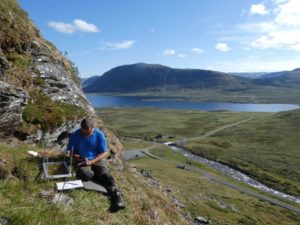
Joachim Töpper (researcher at the Norwegian Institute for Nature Research) is doing vegetation analysis in our locality in Hemsedalsfjellet (Photo: Siri Lie Olsen)
What will happen when the alpine regions in Norway become warmer? What will happen to the existing alpine plants when new species from the lowlands colonize the mountains? Do you want to be a part of answering these questions, and do field work in beautiful mountain regions in Norway? Join us!
Project description
INCLINE is a new project that started in 2018 that includes a warming-and-transplant experiment that investigates what will happen with alpine plants when other species are moving up into the mountains in a warmer climate. We will be doing many different things in this project this summer and can bring you along on the fun fieldwork!
You can read more about the project here: http://www.uib.no/en/rg/EECRG/114810/incline
Things we will do this summer:
- We will install open top chambers in our experiment. These chambers artificially heat the plots by approximately 2 degrees, simulating the changes we expect from global warming.
- Collecting information about species and communities on below ground biomass to understand better what is going on in the system below ground.
- Vegetation analysis of the community. We will identify species and estimate their abundance in a very common method used in plant ecology.
- Demography study of focal species. We have marked every individual of some selected species, and we will follow these in the next years to see if they are surviving and growing. This will give us detailed information about the population dynamics.
- We will perform a field-based seed germination trial in the INCLINE experiment, sowing seeds of all focal species with and without warming, testing the ability of the focal alpine and lowland species to germinate under present and future temperature conditions. We will collect seeds during the season, clean the seed material in the lab (end of August) and sow it in the field (September). If there’s enough seed material we also consider a germination experiment in the lab later in the fall.
- For the focal species, we will also assess the allocation of resources to different plant structures (roots, leaves, stems, flowers) and evaluate how this varies between plant groups of different life strategies and along climate gradients.
- We will investigate reproductive strategies of plants in a temperature and precipitation gradient. To answer these questions we will measure different traits on the flowers on common species in our ecosystems.
Tasks

Do you see something that doesn’t really fit into the alpine vegetation? In this plot we have transplanted lowland species into the mountain. What will happen to the alpine vegetation around these new species? This is what we are trying to figure out in the INCLINE project. (Photo: Ragnhild Gya)
We will be doing fieldwork the whole summer and depending on when you can join, the tasks will be different. A bioSPIRE project lasts for 40 hours (or a week Monday-Friday for fieldwork or cruise). We recommend you to be able to join for a full week because we believe this is what would benefit you the most. However, you can join for two-three days one week, and two-three days another week.
- 27. May – 7. June (depending on the snow melt-out): Setting up open top chambers and installing new climate stations.
- Mid July – late August: collecting floral traits with our master student Gunvor.
- Mid July – late August: collecting resource allocation data with our master student Lasse.
- 22. July – 23. August: Below ground biomass samples, vegetation analysis of plant communities and demography studies of plant populations.
- 2. – 6. September: Seed collection of our focal species.
The project involves: fieldwork
Starting date/period: 27 May 2019 – 6 Sept 2019.

Four individuals of Sibbaldia procumbens have been tagged. We will follow these individuals in the coming years to see if they survive, grow and reproduce. (Photo: Siri Lie Olsen)
Experience:
Depending on when you join us, you learn different things. In the spring/early summer, you will learn about the scientific method and experimental set up. In the summer, you will learn about alpine plant ecology both above and below ground, using several very common methods in plant ecology. In the fall, you will learn to identify species that you collect seeds from, and about data collection and data handling. Depending on your interests, there are plenty of opportunities to obtain some species identification skills.
Interested by this project? Need more info? Contact Ragnhild Gya (ragnhild.gya@uib.no)
Project number: 016
